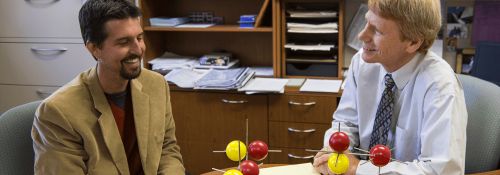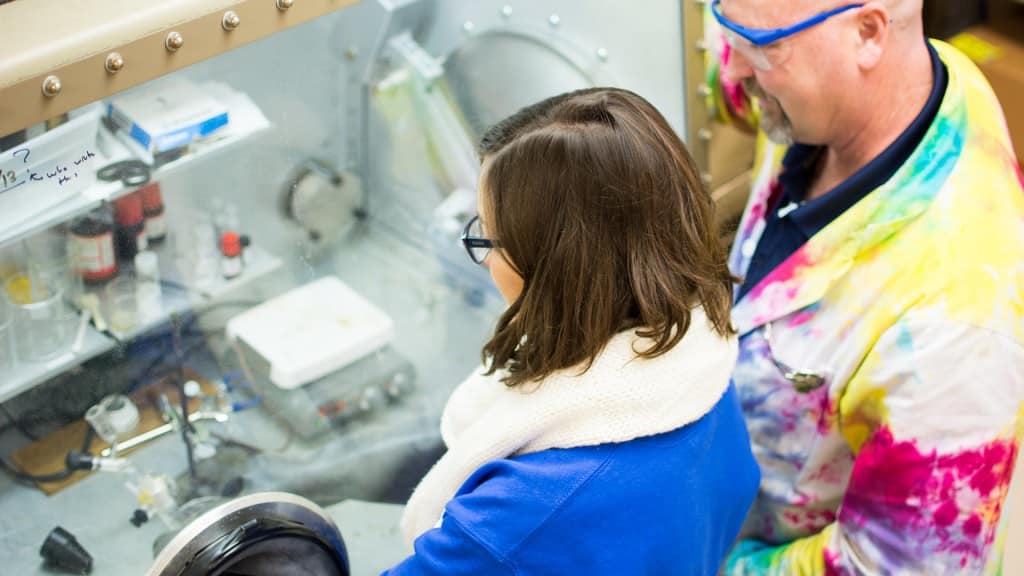
Exploring The Central Science
A Conversation with Dr. Nussbaum and Dr. Young
Written by Kokko Tso
The “Central” Science
If you ask the Hillsdale College chemistry faculty to describe their field, you might hear them call chemistry the “central” science. “Not necessarily the best science, mind you. It just connects everything. Besides, that title just makes chemistry sound cool,” jokes Dr. Matthew Young.
Humor aside, this moniker aptly describes the study of chemistry. As the science that operates in the middle ground between physics and biology, chemistry seeks to describe the nature of matter and energy at the molecular level. Dr. Young notes, “Chemistry plays an important role in our search for an understanding of what is true. As chemists, we are asking very fundamental questions about the physical reality that we find ourselves in.”
Chemistry as an Integral Part of a Liberal Arts Education

While science and humanities are often seen as being opposed to one another, Dr. Mark Nussbaum believes that the two are equally important for anyone seeking a true liberal arts education.
“The study of philosophy, politics, literature, history – these are not extraneous to chemistry students. We want our students not only to be able to master the study of chemistry, but also to understand the connections between what they’re doing in the lab and the larger questions: why is this important and how does this relate to non-scientific matters in life? For that, they need to study other areas in addition to their scientific coursework.”
From a practical standpoint, experience in the humanities also equips chemistry students with useful communication skills. “Sometimes, we’ll get students who think they can avoid reading, writing, and the need to understand historical context by coming over here to the science building, ” adds Dr. Young. “However, It doesn’t matter what you know if you can’t communicate it well. That’s why these things are important.”
Dr. Young likewise encourages non-science majors to participate in the chemistry program: “If you want a true liberal arts education, you need to develop an understanding of how the physical world works. Taking chemistry classes can provide you with that foundation of empirical knowledge.” Furthermore, the knowledge of chemistry has broad applications beyond scientific research or medicine. “If you want to be an informed citizen when discussing public policy issues like global warming, then you need to have some idea of the physical phenomena that are behind these things.”
Small School Collegiality Combined With Big School Resources
What is the formula for an excellent chemistry program? If it lies in having well-equipped facilities, Hillsdale’s chemistry department provides students access to state-of-the-art labs and an impressive array of modern chemical instrumentation. If it lies in offering a comprehensive program of study, the department has specialized faculty in each branch of chemistry: analytical, biological, inorganic, organic, and physical. If it lies in preparing students for successful careers, the achievements of its graduates – from traveling to Antarctica to measure cosmogenic isotopes, to joining the research faculty at the National Superconducting Cyclotron Laboratory – attest to the excellent training that students receive.
However, the key strength of Hillsdale’s chemistry program goes beyond its well-equipped facilities, the excellence of its faculty, or the success of its graduates, as impressive as they are. The chemistry department here combines the collegiality and individual attention of a small-school environment with the resources and wide expertise of a program many times its size. Dr. Nussbaum explains, “I think we represent a happy medium between programs at small liberal arts schools and those at large universities. Our department is small enough for faculty to really get to know each of the students well, yet we are at a size where we have all the major facilities that you would find at a large university. This environment benefits students in many ways; students all receive individual attention from faculty, not just teaching assistants. Professors are able to write genuinely personal recommendation letters for students because they have worked closely with them, and students still get to develop their laboratory skills with sophisticated equipment.”
The chemistry department’s focus on undergraduate education also means that all majors get the opportunity to pursue original research. “We’re a teaching institution first, but it doesn’t mean that we don’t do cutting-edge research,” Dr. Nussbaum says. “Rather, when we do research, we approach it with the students’ interest at heart. It’s not for the purpose of padding faculty resumes, but for the purpose of helping students understand how to do science. Our students drive the research here, from the lab work to the overall direction of a study, and this gives them invaluable experience in conducting research studies and exposure to a lot of important experimental techniques.”
Developing Life-Long Learners
“We want our students to become lifelong learners.” Dr. Nussbaum’s statement encapsulates the mission of the chemistry program at Hillsdale. This shared desire to pursue knowledge permeates every aspect of the program, driving the close relationships between students and faculty. The program combines a rigorous curriculum with abundant academic support. According to Dr. Nussbaum, although chemistry students must “work their tails off, they seem to come out at the end happy with the program and prepared to succeed in their careers.”
Dr. Young concludes with a smile, “Hillsdale really is a great place to study science. The professors do a great job, and you are pursuing a science major in a place where you have to take other classes – ones that you’ll probably whine about for a little bit – but they’re really important.”
Kokko Tso graduated from Hillsdale College in 2013 with majors in music, Latin, and history. He currently works for his alma mater as the Digital Content Manager.